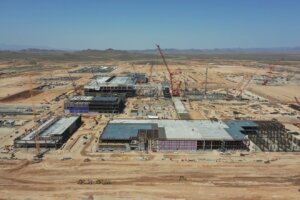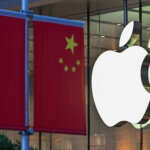Apple is slowly pivoting away from Asia as it eyes chips made in the US

Taiwan Semiconductor Manufacturing Co (TSMC) has become one of the most crucial technology partners of Apple, producing the cutting-edge chips that are the brains behind iPhones, iPads and now Macs. For years, the chip giant has been retaining most of its production in Taiwan, making Apple very reliable on Asian production.
Over the past year however, TSMC has started to diversify to help meet demand in countries seeking to bolster semiconductor production. To put the diversification into context, the company is currently spending US$12 billion building a plant in Arizona, its first in the US, which is expected to complete by 2024. Interestingly, the company has also started planning its second plant in the US, also within Arizona, taking on the Biden administration’s strategy to bolster US chipmaking.

Aerial photos show TSMC construction progress in May 2022, about a year after breaking ground.
Source: TSMC
Now, since TSMC is expected to remain Apple’s sole chip supplier for the foreseeable future, Chief Executive Officer Tim Cook has disclosed that Apple is planning to move chip production out of Asia eventually, to rely on chips made in the US by the Taiwanese giant. A move in that direction would make sense, given the ever-growing risk to Taiwan from China, but the timescale of any such plans is not known.
Besides the US, TSMC is also building a US$7 billion plant in Japan, while in talks with Germany about potentially establishing a separate facility in the country.
What do we know about the chips Apple is eyeing in the US?
“We’ve already made a decision to be buying out of a plant in Arizona, and this plant in Arizona starts up in ’24, so we’ve got about two years ahead of us on that one, maybe a little less,” Cook told Apple employees. “And in Europe, I’m sure that we will also source from Europe as those plans become more apparent,” he said at the meeting, according to Bloomberg.
Of course, Cook is referring to an Arizona factory that will be run by TSMC, Apple’s exclusive chip-manufacturing partner. TSMC founder Morris Chang mentioned earlier today that the semiconductor giant will build 3-nanometer chips at its Arizona factory, though final plans are not ready to be shared yet.
During a press conference in Taipei, Chang said “TSMC right now has a plan, but it has not been completely finalized,” Reuters reports. “It has almost been finalized—in the same Arizona site, phase two. Five-nanometer is phase one, 3-nanometer is phase two.” For context, as the world’s largest foundry, TSMC makes almost half of the world’s most advanced chips.
The dominance of Taiwan’s semiconductor companies (TSMC’s peers include Foxconn) is one of its major advantages against China, which considers Taiwan a province of its own. On its website, TSMC says its 3-nanometer tech, called N3, will be a full node stride from its 5-nanometer technology, and offer up to 70% logic density gain, up to 15% speed improvement at the same power, and up to 30% power reduction at the same speed when compared to its predecessor.
It is targeting volume technology in the second half of this year. TSMC could theoretically introduce advanced production more quickly than it has so far announced. That said, Apple could also potentially use the Arizona production for less complex components in its devices. “While most of the final assembly for Apple products is handled in China and surrounding countries in Asia, Apple does have a set of suppliers that manufacture components domestically,” the Bloomberg report noted.
The California-based company has touted the idea that Mac Pro models sold in the US could be assembled in Texas. Besides TSMC, other foundries working on 3-nanometer chips include Samsung Electronics, which started producing 3-nanometer chips in June, ahead of TSMC. Samsung said last year it would invest 171 trillion KRW (US$132 billion) in its logic chip and foundry business by 2030, and it is also building a semiconductor plant in Texas.










